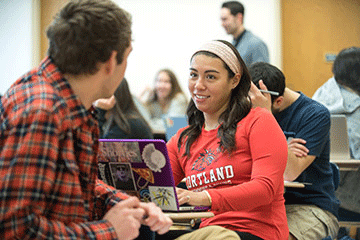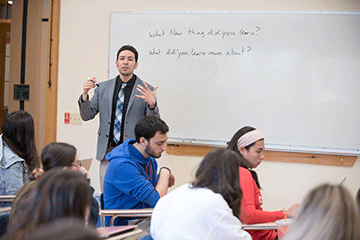Students learn philosophy of philanthropy

05/21/2019
Thirty-three SUNY Cortland undergraduates recently decided to give away $10,000 in real money to four Cortland non-profit organizations they think will use the funds to help develop local residents’ capability for education and emotional well-being.
Their class, Philanthropy and Civic Engagement: Learning by Giving, selected the winners from among the 13 competing local charities that had submitted applications by using a philosophical framework that stressed building overall capability over one-time projects.
The donated grant money this year will be split between the Franziska Racker Center, the Seven Valleys Health Coalition, the Child Development Council, and the Cortland County Community Action Program (CAPCO).
Every year, for the last nine years, the national Learning by Giving Foundation has helped provide $10,000 for the class to teach students skills in using limited resources to make a significant change in their community. This year, half of the fund was provided by the Cortland Community Foundation.
The decision-making process required the students to learn a lot more than philosophy.
“I taught them the world’s fastest accounting course in order to handle this assignment,” explained their teacher, Sebastian Purcell, an associate professor and interim chair in the Philosophy Department.
The three questions Purcell put to them as they discussed their final paper requirements were: what new thing had they learned in dealing with the 13 local charitable agencies? What area of knowledge had they expanded? What comfort zone were they pushed out of during the hands-on educational experience?
“I had to learn to be professional and in-the-moment with the agency people, for example, if they called me back two hours after I called them,” said Lauren Murphy, a junior childhood/early childhood education major from Valley Cottage, N.Y.
Each class member was assigned to call between eight and 10 people affiliated with the charities, Purcell noted.

“I’ve been in this community for three years,” said Olga Grygiel, a junior biology major from Staten Island, N.Y., as class members discussed their answers in groups of two and three. “Now I know what resources are available and not available. I’ve learned what I can push for.”
“I’ve learned how to read forms and how to process them,” said Jaime Radler, a junior childhood/early childhood education major from Oyster Bay, N.Y.
“I’ve found that what goes on their application is about more than what it is they want,” said Megan Leverich, a senior childhood/early childhood education major from Smithtown, N.Y. “It’s about their impact.”
The unique SUNY Cortland course focuses on the practical side of philanthropy.
For the last two years, the students have applied philosophical theories on ethics and logic to guide them in picking the fund beneficiaries. The course has previously been taught at SUNY Cortland from the perspective of political science or community health. Class size has grown and now bursts at the seams.
This year, the class had a different focus than last year’s priority of funding health initiatives.
“The students thought a specific focus on ‘collective initiatives for education and emotional well-being’ would be more appropriate,” Purcell said.
What this means is the money will be going to promote capabilities among people to achieve things they value. The students had concluded the approach will ultimately have the biggest positive local impact on the community.
The decision-making process was guided by a serious consideration of capability theory as one finds it in the work of the philosopher Martha Nussbaum, according to Purcell.
The capability approach is an economic theory conceived in the 1980s as an alternative approach to welfare economics. In this approach, Amartya Sen and Martha Nussbaum bring together a range of ideas omitted from traditional approaches to the economics of welfare. The core focus of the capability approach is on what individuals are able to do.
“One can, of course, treat a child for an illness, but another approach might aim to foster an hygienic environment to prevent contraction in the first place,” Purcell said to illustrate the concept of capability. “To put the matter intuitively, capability theorists look towards the latter solution.”
Purcell explains that economically, capability theory directs considerations away from broad and blunt measures, such as gross domestic product (GDP), to a range of further measures that identify how capital is flowing into different areas of practical living.
“Increasing GDP, after all, is compatible with declining standards of living for the majority,” Purcell noted.
The class used Nussbaum’s 2011 book Creating Capabilities: The Human Development Approach to identify 10 core capabilities. Then the class voted and discussed which of those might be most impactful for the Cortland community.
The students also consulted data on Cortland County that the Seven Valleys Health Coalition made publicly available in their 2013 white paper, “Cortland Counts: An Assessment of Health and Well Being in Cortland County.”
The class additionally looked to updated data in the agency’s 2017 and 2018 report cards to identify trends.
“One key difference from the way that people often address charity is that the class focused less on impact and more on making sure that the decision process for weighing values and strategies was excellent, or ‘virtuous’ in philosophical terminology,” Purcell said.
“There are no algorithms for this,” he said. “Your best approach is to make sure your delegation is done well, that is, choosing the correct mix of decision-makers and setting up the proper method of decision-making.”
With that in mind, Purcell engaged the students in completing a series of personality profiles and then set up teams composed of people with very different approaches to tasks and problem-solving.
“I’m deliberately putting together people who are not cognitively together,” Purcell said. “I tried to group those people in such a way as to challenge each other.”
That way, he noted, the decision resulting from their evaluation of the charity applicants came about through group consensus rather than the force of one strong-willed individual.
“The class wanted to make sure that the values chosen — from those 10 capabilities — were weighed well, and that the discussion about the proposals was similarly well-conducted,” Purcell said. “Only at the end did students ask questions about how much of a difference various strategies would make. In a line, they took a ‘virtue ethical,’ rather than a ‘utility maximizing’ approach.”
“I should also note that the class predominantly relied on women philosophers,” Purcell said. “Amartya Sen, a Nobel laureate in economics, is known for developing capability theory for economic theory. But the class found Nussbaum’s work to be more informative.”
Similarly, the class discussed Aristotle’s virtue ethics — even his virtues of generosity — but ultimately found a stronger connection with the work of University of Minnesota Professor Valery Tiberius on the virtues of reflection as described in her 2008 book, The Reflective Life.
The success of this year’s “capability” approach was evident in the winning project details:
- The Franziska Racker Center, which supports people with disabilities, will receive $5,000 for a sensory room project for Cortland County pre-school students with autistic spectrum disorder. The sensory room is intended to provide a safe space for these students to receive the special care and attention that they need.
- The Seven Valleys Health Coalition was awarded $2,500 to complete a series of culinary seminars for adults. The program strives both to feed the adults and to enable them to learn how to make use of the healthy foods they already receive from partnering support programs.
- The Child Development Council was chosen for $1,500 for the Surrounded by Books project, which will provide developmentally appropriate and multiculturally inclusive books to designated childcare programs or centers.
- The Cortland County Community Action Program (CAPCO) was presented with $1,000 to support its the High School Equivalency Graduation Ceremony. The funds will complete two graduation ceremonies for students who are receiving their GED and otherwise would have no ceremony.
The four grant winners were formally announced on May 13 during an award ceremony in Old Main Brown Auditorium.
The Boston-based Learning by Giving Foundation seeks to advance the next generation’s understanding of philanthropy by providing the financial, technological and intellectual tools to maximize community impact. Half of this year’s grant money was donated by the Cortland Community Foundation, in keeping with the Learning by Giving Foundation’s requirement for communities to raise part of their own support. In all, $90,000 has flowed back into Cortland and to charities and agencies through the program. All of the funding is given to the local agencies and none can be spent on grant administration.
In addition to the Philosophy Department, the course is sponsored by the College’s Institute for Civic Engagement, the Dean of Arts and Sciences Office and the Cortland Community Foundation. For more information, contact Purcell at 607-753-2192.

